- Home
- Lauren Willig
The Summer Country Page 5
The Summer Country Read online
Page 5
“Apologies, madam, but this is private property. It’s not safe. I’m afraid you and your guide—”
“I know it’s private property,” interrupted Emily, and thought she saw a spark of amusement in Dr. Braithwaite’s dark eyes. “Dr. Braithwaite was merely—”
“Doctor? Braithwaite?” The man squinted at Dr. Braithwaite, holding up a hand to shield his eyes against the sun. “Nat! Is that you? I scarcely knew you in that getup. And that mustache.”
“You look well too,” retorted Dr. Braithwaite.
The other man choked on a laugh. “Is that your professional opinion?” With a dimple in his cheek and the color fading from his face, Emily could see that he was younger than she had originally supposed, close to Adam’s age, or her own.
Bowing to the inevitable, Dr. Braithwaite said, “Miss Dawson, may I present to you Mr. George Davenant?”
Mr. Davenant bowed over Emily’s hand. “Very pleased to make your acquaintance, Miss Dawson.”
Emily looked from one man to the other, Mr. Davenant smiling, Dr. Braithwaite not. “I take it that you are acquainted?”
“We played together as boys,” said Mr. Davenant easily, his cheeks creasing at the memory. “Some of the things we got up to—”
“Dares, for instance?” said Emily, watching the doctor’s face.
Mr. Davenant grinned. “Among other things.”
Dr. Braithwaite was not inclined to elaborate. “That was a long time ago.”
“Before you went off to—Edinburgh, was it?” said Mr. Davenant.
“Among other places.”
“I’d heard you’d returned.” Mr. Davenant turned to Emily, so determinedly cheerful that Emily wondered if she’d imagined the note of reproach in his voice. “I hope you’ll forgive me for my rudeness just now, Miss . . .”
“Dawson,” provided Emily.
“Miss Dawson.” Mr. Davenant smiled winningly at her. “We’ve had some trouble with trespassers. With the house sitting empty . . .”
“Trespassers?” said Emily, wondering, for a moment, if they’d got the wrong place. Perhaps this ruined shell was someone else’s, and down the road they’d find the white painted villa of her imagining, humbler but more welcoming.
“You’re the trespasser,” said Dr. Braithwaite amiably. “Peverills belongs to Miss Dawson.”
“Peverills—what?” Mr. Davenant looked as confused as Emily felt.
“My grandfather left it to me,” explained Emily, who was beginning to feel as though she ought to have that embroidered on her forehead. What her grandfather had left her, it appeared, was a confusing mess.
A challenge, she corrected herself.
Mr. Davenant drove his fingers through his fair hair, making his hat skew at an odd angle. “Forgive me. I don’t understand. We knew it had been purchased, of course, but . . . that was over twenty years ago.”
“Twenty,” echoed Emily.
Her grandfather had bought the plantation over twenty years ago and let it sit empty, fallow. Her grandfather, who squeezed a shilling until it squeaked in pain, who lectured the kitchen maids on waste and prided himself on driving only the canniest deals and hardest bargains.
And then he had left it to her, ruined fields, house, and all.
Mr. Davenant was still speaking. “No one’s appeared or said a word since. So you can see why it comes as a bit of a surprise to me to find a claimant on the doorstep. And such a charming one,” he added belatedly, with an attempt at a smile.
“Not a claimant,” corrected Dr. Braithwaite. “An owner.”
“Have you turned lawyer as well as doctor, Nat? But I do beg your pardon, Miss Dawson. I didn’t mean to offend. It was a poor choice of word.”
“An understandable one under the circumstances,” said Emily, since Mr. Davenant’s distress begged reassurance. She shook herself back to the present. “I haven’t the slightest notion why my grandfather did what he did, but I can assure you, the papers are all in order.”
“So it seems we are neighbors—of sorts.” Mr. Davenant squeezed the brim of his hat between his hands, the gears of his mind visibly turning. “The house isn’t habitable, of course. We might have told you if you’d asked. . . .”
“I did tell her,” said Dr. Braithwaite drily.
Emily cast him a quelling look. “Is there anywhere on the property that is habitable?”
“The bookkeeper’s house,” said Mr. Davenant automatically, and then, quickly, “But you can’t be thinking of living here! There aren’t any of the amenities to which a lady might be accustomed.”
He hadn’t the faintest idea of what she was accustomed to. “Not all ladies require damask drapes and velvet cushions.”
“You’ll have a hard time finding help,” interposed Dr. Braithwaite unhelpfully. “The house is accounted haunted.”
“I’m not afraid of ghosts, Dr. Braithwaite. Or hard work.”
“There’s certainly plenty of that,” said Mr. Davenant, smiling at her in a way that invited her to join in. “You should know you can call on Beckles for any help you might need.”
“That’s very kind of you,” said Emily, taken aback. “You don’t even know me.”
“We’re a small community and a close one,” said Mr. Davenant. “You’re the owner of Peverills now.”
He was the first person who hadn’t assumed she would be selling as rapidly as possible, and Emily was inordinately grateful to him for it. “Thank you. I may need more help than you know. I’m profoundly ignorant when it comes to agriculture.”
Mr. Davenant pulled a wry face. “I should have liked to be more ignorant. It’s my grandmother who loves the land. I’ve tried to love it, for her sake, but . . . What am I thinking? This is hardly a salubrious place for discussion.” He looked earnestly at Emily. “Must you hurry back to town? I would invite you to take your potluck with us at Beckles. . . .”
“I should have liked to, but my cousins are waiting.” Emily glanced back toward the carriage. “We have an engagement in Bridgetown this evening, a reception at the governor’s house.”
“You’ve plenty of time, yet. I hope I haven’t offended with the lack of formal invitation. I know my grandmother will wish to make your acquaintance. And that of your party, of course.”
“I advise you to accept Mr. Davenant’s invitation,” said the doctor, taking advantage of Emily’s momentary silence. “Beckles is famed for its hospitality. You wouldn’t want him to be behindhand in his attentions.”
“Less so now than in my grandfather’s day,” he said with a self-deprecating dip of his head, “but we try as best we can to maintain the old standards. I can promise you a cool drink, at the least.”
“You make it very hard to refuse,” said Emily. “I must consult my cousins. . . .”
“Certainly. My grandmother will be delighted. As am I, of course.” Mr. Davenant seemed so relieved that Emily didn’t have the heart to tell him that she hadn’t quite accepted. It appeared that, by omission, she had. “I cannot promise what you are accustomed to in England, Miss Dawson, but we shall be delighted to have you share our meager meal.”
“By which he means,” said the doctor, “that you may expect a banquet.”
Chapter Four
Christ Church, Barbados
February 1812
“Do we always set out a banquet for breakfast, Robert?” Charles pulled out a chair, wishing that the legs wouldn’t scrape so against the wood floor. The sound was like a pick being driven into his skull.
But it was the smells that were the worst: sliced cold beef, congealing on its plate; fresh ham, studded with cloves; peppers, swimming in brine; and, above it all, the pungent, unmistakable smell of pickled fish.
What in the devil had been in that punch last night?
Charles’s little brother was already seated at the head of the table, booted feet propped up on the neighboring chair, a plate in front of him weighed down with beef, ham, fish, and something stewed that Charles couldn’t nam
e and didn’t want to try.
“You need something in your stomach before you ride the fields.” Robert speared a piece of rare beef. Charles tried not to wince as Robert let it dangle from his fork. “This isn’t London.”
“No,” said Charles mildly. “It’s warmer, for one.”
Someone had placed a variety of beverages at the center of the table. Charles bypassed the decanter of Madeira and the bumper of hock negus and made straight for the porcelain coffeepot. It wasn’t the silver coffeepot, the one they put out for company, but the one he remembered from his childhood, a conical thing of Chinese porcelain, with a dragon’s head for a spout. If one squinted at it in just the right way, the chip on the dragon’s mouth looked almost like a tooth.
Charles could picture his mother’s hand on the curiously shaped handle. But nothing else. Just a pale hand in a sleeve edged with lace.
“All of this . . .” Charles poured himself a cup of coffee, black, without sugar. “It’s a bit much for two bachelors, isn’t it?”
Robert glanced sideways at him. “Preaching economy, brother?”
Robert’s eyes were brown, like their mother’s. Like the little boy, still in skirts, who used to follow Charles around on his expeditions, stumbling over his own chubby legs. It was hard now, to see that boy in Robert. He was tall as Charles, impeccably turned out in well-tailored riding togs.
It wasn’t that Charles had expected to find the same adoring little brother he had left all those years ago, not really. Or maybe just a little. But he hadn’t been prepared for the hostility his brother did little to hide.
Charles took a cautious sip of his coffee, waiting for it to burn up to his brain. “From what I’ve seen, economy does seem to be called for.”
“Would you have us live like those poor beasts in St. Andrew, grubbing for a few roots?” Robert forked up something pungent and stewed. Charles looked away. “It all gets used, one way or another. The house servants would be up in arms if you stint at table. They think of the excess as theirs.”
“They might prefer more on their own account, I should think.” Bypassing the meats, Charles selected a plain roll and a sweetmeat of candied ginger. He took a careful bite of the latter, feeling the sugar turn to acid on his tongue, the bite of the gingerroot beneath.
“It’s not about the food.” When Charles looked at him blankly, Robert set down his fork with a clatter. “It’s about their rights. The house servants have a right to the leavings at table. They eat it; they trade in it. It sets them above the others.”
He said it as though it ought to make perfect sense. Charles wished he felt clearer headed; his night at Beckles had sucked him dry. “Wouldn’t a full stomach be preferable to an empty honor?”
“Tell that to any courtier at Versailles.”
“We saw what happened at Versailles,” said Charles soberly. “And after.”
Robert swung his feet down to the floor, looking full at his brother for the first time, and Charles was struck by the force of his resentment. “Do you want someone to put our heads on the block? Then go on and meddle with the way things are done. Never mind that you haven’t been here. I’m sure you can tell us all about everything we’ve been doing wrong.”
“Robert—”
Whatever Charles might have said to placate his brother was lost, interrupted by a servant bearing a note on a silver tray. It was written on cream paper, sealed with red wax. Inside were only three lines.
“From Beckles?”
Charles looked up sharply.
Robert shrugged, tilting back in his chair. “I recognized the seal.”
There was something about his studied nonchalance that made Charles wish the note in his hand to perdition. Carefully, he said, “Miss Beckles has invited me to ride with her.”
“That’s quick work.” The derision in Robert’s voice could have stripped the painted paper from the wall. “Three days home and you’ve already secured an heiress. I wish you both very happy.”
Charles tossed the note down on the table. “I haven’t secured anyone.”
Robert didn’t deign to answer, only pulled the platter of ham closer, looking over the pieces with exaggerated care. “No meat for you, brother? Or haven’t you the stomach for it?”
He hadn’t the stomach for any of it.
Disjointed memories of the previous night chased themselves around Charles’s brain. The veranda at Beckles, candle flames bobbing like will-o’-the-wisps. The colonel’s barbed bonhomie.
Not but what it’s hard for him being a second son, eh?
My niece is not like other women.
Mary Anne Beckles was an heiress; Robert a younger son. Was that what all this was about? Was Charles being cast as Count Paris to his brother’s Romeo? From what he’d seen, Miss Beckles made an unlikely Juliet, quiet throughout dinner, but that might have been resentment only, resentment at being made to dine with the heir, the designated suitor.
Looked at in that light, the evening took on a distinctly different cast. The message sent by the maid—her uncle’s doing, not hers? The offer of a woman for the night. Jenny. Charles could picture the maid, her apron ghostly white in the torchlight. All a test, like something out of a fairy story?
Charles decided he didn’t care to know. He didn’t want anything to do with any of it. He was here to take over management of the family plantation, not to engage in intrigues, romantic or otherwise. And if his brother had an interest in that direction, by God, he’d be damned if he ruined his chances.
Their parents’ marriage had been a love match. Imprudent, some had said, an heiress marrying a dancing master, a younger son without prospects, albeit from a proud English family. But Charles could remember them still, sitting together of an evening, their heads close together, speaking in soft voices as Charles played on the floor with his toy soldiers.
“Did you have designs in that direction?” Charles asked neutrally. “Because if you do—”
“What, me? You can have the heiress and welcome to her.” Robert pushed back his chair, sending pain exploding through Charles’s skull. “I’m just a younger son, good for nothing but to be left at home.”
“Would you like to go to England?” Charles demanded, trying to keep the irritation from his voice. He told himself he’d be patient with Robert, be understanding, be kind, but it was maddening to be made the villain for something that was none of his doing. “Is that what this is all about? I could arrange it, if you liked. Letters of introduction, lodging—”
“For what?” Robert’s voice cracked, and Charles was reminded, jarringly, of how young his brother was still, never mind the breadth of his shoulders or the bold brass buttons of his coat. There were six years between them, but it felt more like ten. “So I can be told I’m a bumbling colonial? No thank you, Charles. I have no desire to go abroad to be sneered at.”
“It isn’t too late,” said Charles, even though he knew it to be a lie. Or, if not a lie, then not entirely true. It had been bad enough for him at seven; it would be far worse for Robert at nearly twenty-one. “I have friends in England who would welcome you.”
Not family. Their Davenant cousins, safe in the security of their Elizabethan estate in Essex, had nothing but mockery for their West Indian relations. Charles had spent several miserable holidays at Beauleigh Abbey those first few years in England. A dead rat in his bed, incongruously wrapped in cloth of gold, with a tag around his neck reading “nabob,” had been the best of it. Charles had been only too delighted to abandon Beauleigh for the homes of his classmates, avoiding his relations whenever possible.
His head still aching, Charles said shortly, “If not England, then why not elsewhere? The Continent is hardly fit for travel, but you might visit America if you liked. Mother had cousins in Charleston.”
“Trying to get rid of me, brother?”
“Hardly. I need your help even more than you know.” Charles rubbed his aching temples. “If you wanted to go so badly, why did you never say?”
Robert rose from his chair, resting a hand against the polished mahogany of the sideboard. “Someone had to be here with Mother. She was entirely bedridden by the end, did you know? She liked to have me to read to her. Besides,” he added abruptly, “there was no money. Father couldn’t afford to keep two sons in school.”
Charles stared down at his empty plate, lost for an answer. He’d thought himself so abstemious, so virtuous, all because he’d never wagered too high or developed a taste for expensive horses. But there had been a thousand expenses, all the same. All of it had seemed so reasonable at the time. Furnishings for his rooms at Oxford, new suits of clothes, just the standard perquisites of a gentleman. His father had never said him nay. And West Indian planters were all rich, everyone said. Charles’s memories were of servants circling around him, silver shining from the sideboard, objets d’art from France and books from England.
Why had no one ever said?
Charles cleared his throat. “If I’d known how bad it was, Robert, I’d have come home years ago. Believe me. Father never said. I’d thought—”
That they were rich as everyone claimed. That everything at home was just as Charles had left it, eternally the same, gilded in sunshine and wonder.
Robert smiled, but it was a Medusa smile, beautiful and cold. “No, he wouldn’t, would he? Could you see him admitting what a failure he’d been? Oh, no. Wouldn’t want to tarnish that heroic image.”
Charles shifted uncomfortably on his chair. “That’s not entirely fair. The import duties—”
“And the prices, yes, I know! But we might have managed better. When we might have expanded our land, Father built model farms. Model farms. He had an idea he could turn the slaves into yeomen farmers.”
Their father’s ideas had been much praised in certain circles in London. “Was it such a terrible idea?”
Robert cast him a look. “Just look at the books.”
“I mean to,” said Charles calmly. “I have an appointment with the bookkeeper after breakfast. Fenty?”

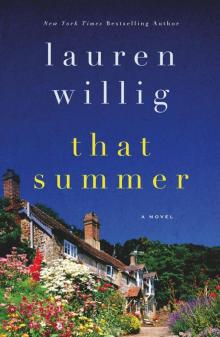 That Summer
That Summer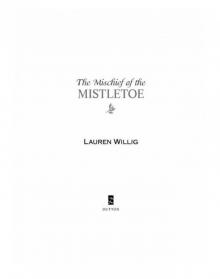 The Mischief of the Mistletoe
The Mischief of the Mistletoe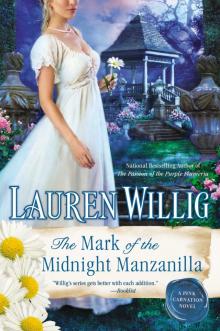 The Mark of the Midnight Manzanilla
The Mark of the Midnight Manzanilla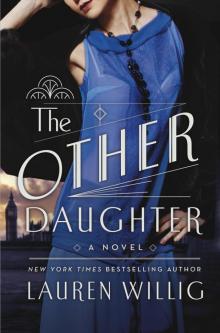 The Other Daughter
The Other Daughter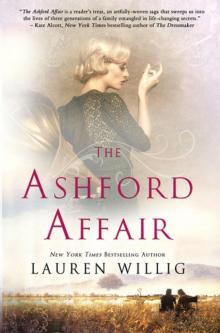 The Ashford Affair
The Ashford Affair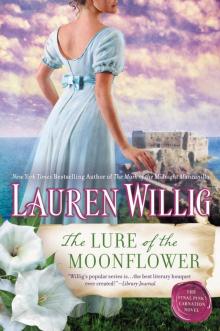 The Lure of the Moonflower
The Lure of the Moonflower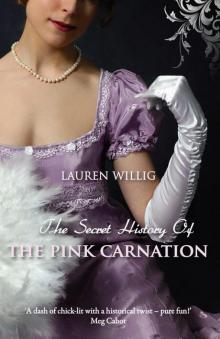 The Secret History of the Pink Carnation
The Secret History of the Pink Carnation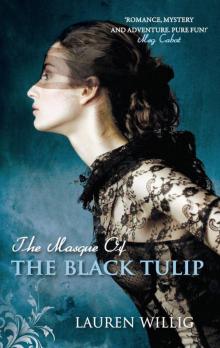 The Masque of the Black Tulip
The Masque of the Black Tulip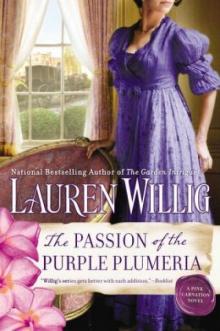 The Passion of the Purple Plumeria
The Passion of the Purple Plumeria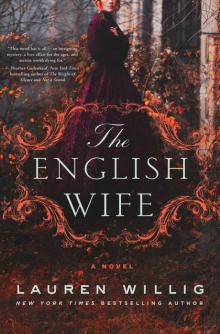 The English Wife
The English Wife The Garden Intrigue
The Garden Intrigue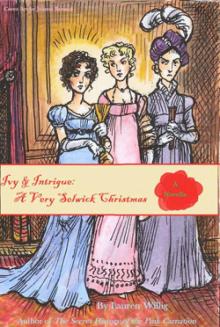 Ivy and Intrigue: A Very Selwick Christmas
Ivy and Intrigue: A Very Selwick Christmas The Orchid Affair
The Orchid Affair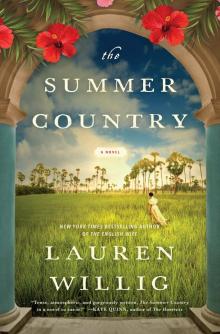 The Summer Country
The Summer Country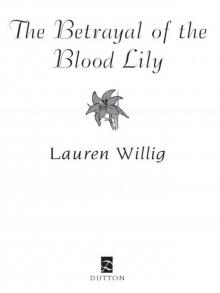 The Betrayal of the Blood Lily
The Betrayal of the Blood Lily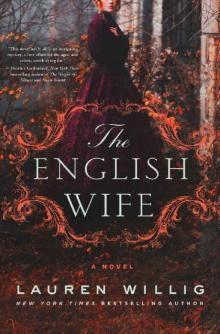 The English Wife: A Novel
The English Wife: A Novel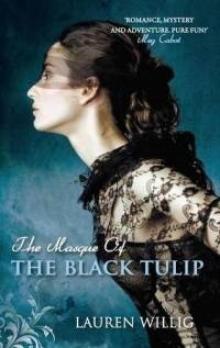 Masque of the Black Tulip pc-2
Masque of the Black Tulip pc-2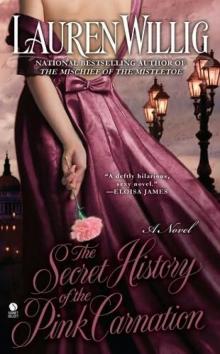 The Secret History of the Pink Carnation pc-1
The Secret History of the Pink Carnation pc-1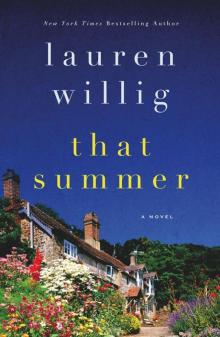 That Summer: A Novel
That Summer: A Novel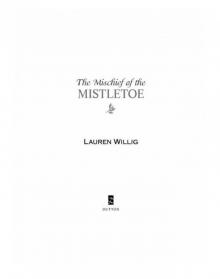 The Mischief of the Mistletoe: A Pink Carnation Christmas
The Mischief of the Mistletoe: A Pink Carnation Christmas